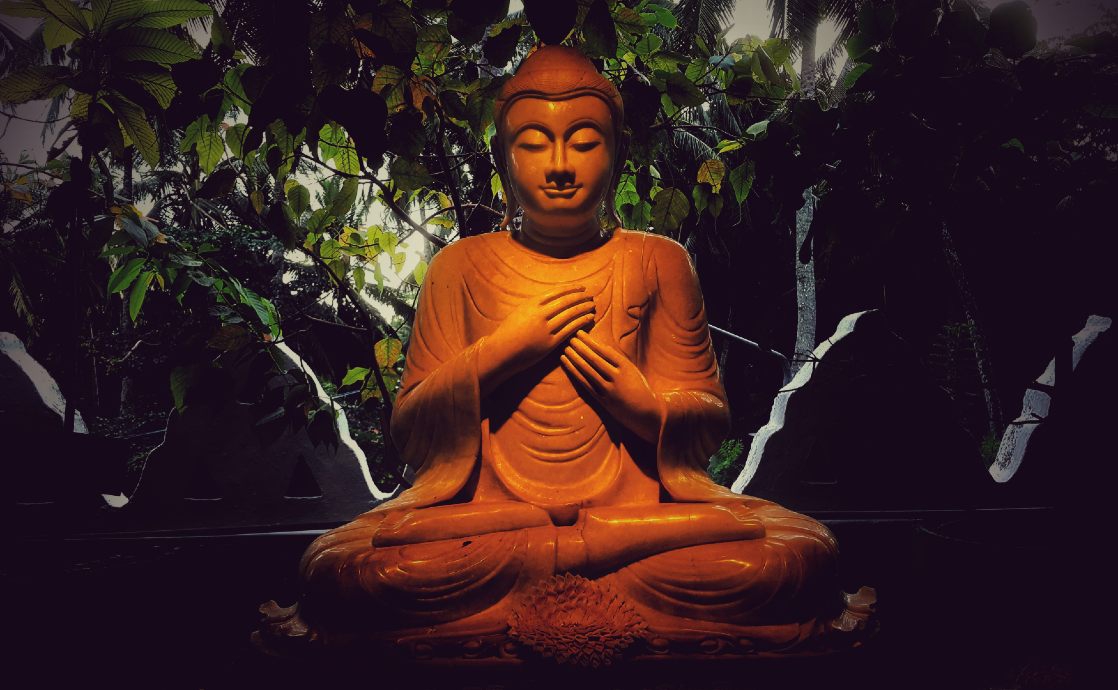The views expressed in our content reflect individual perspectives and do not represent the authoritative views of the Baha'i Faith.
In the predominant Western practices of Buddhism, many followers insist that the Buddha’s teachings are non-theistic, and that Buddhists do not believe in a Creator. Let’s examine that premise.
RELATED: Is There a God in Buddhism?
Several scholars and historians believe that the Buddha, recognizing Vedic Hindu society’s super abundance of gods, decided that any further discussion of God could only lead to dogmatic distraction. They conclude that the Buddha’s elegant solution simply involved talking about the reality of the human condition, the best way to live to avoid suffering, and how to move toward a spiritual state of nirvana.
RELATED: Are Buddhist Scriptures Authentic?
Because of those teachings and the practical way the Buddha transmitted them to his followers, many still make the mistake of thinking that the Buddha did not believe in God. The Buddha, however, clearly proclaimed in Udana 8:3 of the Khuddaka Nikaya:
There is an Unborn, an Unoriginated, an Unmade, an Uncompounded; were there not, O mendicants, there would be no escape from the world of the born, the originated, the made, and the compounded.
This, clearly, is God stripped of all anthropomorphism. It is the Reality that makes salvation or nirvana possible, and it’s consonant with Tillich’s definition of God as “the Ground of all Being” and with Baha’u’llah’s description of God as “an Unknowable Essence” in the Baha’i writings:
So perfect and comprehensive is His [God’s] creation that no mind nor heart, however keen or pure, can ever grasp the nature of the most insignificant of His creatures; much less fathom the mystery of Him Who is the Day Star of Truth, Who is the invisible and unknowable Essence. The conceptions of the devoutest of mystics, the attainments of the most accomplished amongst men, the highest praise which human tongue or pen can render are all the product of man’s finite mind and are conditioned by its limitations.
Not only did the Buddha believe in God, he had special knowledge of God, proclaiming to his disciple Vasettha in Sutta 1:43 of the Tevijja:
For Brahman [God] I know, Vasettha, and the world of Brahman, and the path that leadeth unto it. Yea I know it even as one who has entered the Brahman world, and has been born within it.
The Buddha also made clear that he did not reveal everything he knew of God. A scriptural passage, SN 5:437, explains the Buddha’s selectivity in revealing knowledge to us, when the Buddha asks:
Now what think ye, brethren? Which are more, these few simsapa leaves that I hold in my hand, or those that are in the simsapa grove above?
Few in number, Lord, are those simsapa leaves that are in the hand of the Exalted One: far more in number are those in the simsapa grove above.
Just so brethren, those things that I know by my super-knowledge, but have not revealed, are greater by far in number than those things that I have revealed. And why brethren have I not revealed them?
Because, brethren, they do not conduce to profit, are not concerned with the holy life, they do not tend to repulsion, to cessation, to calm, to the super-knowledge, to the perfect wisdom, to Nibbana [Nirvana]. That is why I have not revealed them.
This is the Buddhist version of Christ’s statement in John 16:12: “I have yet many things to say unto you, but ye cannot bear them now;” and Baha’u’llah’s statement in his Book of Certitude:
It is obvious and manifest that the true meaning of the utterances of the Birds of Eternity is revealed to none except those that manifest the Eternal Being, and the melodies of the Nightingale of Holiness can reach no ear save that of the denizens of the everlasting realm.
It is true that most forms of Buddhism speak little of a Creator. But creation stories actually fill very little of Western scripture, as well. What really fills that scripture are accounts of historical events and attempts to describe our attraction for the Being to Whom we are connected, our wonder at being in the world, and our discovery of what leads to personal and social advancement or abasement. This is also what fills Buddhist scripture. At heart, the Baha’i teachings say, Eastern and Western religion have the same goal and are occupied with the same tasks:
Consider the rose: whether it blossometh in the East or in the West, it is none the less a rose. For what mattereth in this respect is not the outward shape and form of the rose, but rather the smell and fragrance which it doth impart.
Purge thy sight, therefore, from all earthly limitations, that thou mayest behold them all as the bearers of one Name, the exponents of one Cause, the manifestations of one Self, and the revealers of one Truth, and that thou mayest apprehend the mystic “return” of the Words of God as unfolded by these utterances.
In the book “The Four Noble Truths”, the Dalai Lama makes the same basic point very well, too:
For a non-Buddhist, the idea of nirvana and a next life seems nonsensical. Similarly, to Buddhists, the idea of a Creator God sometimes sounds like nonsense. But these things don’t matter; we can drop them. The point is that through these different traditions, a very negative person can be transformed into a good person. That is the purpose of religion — and that is the actual result.
















Comments
Sign in or create an account
Continue with Googleor